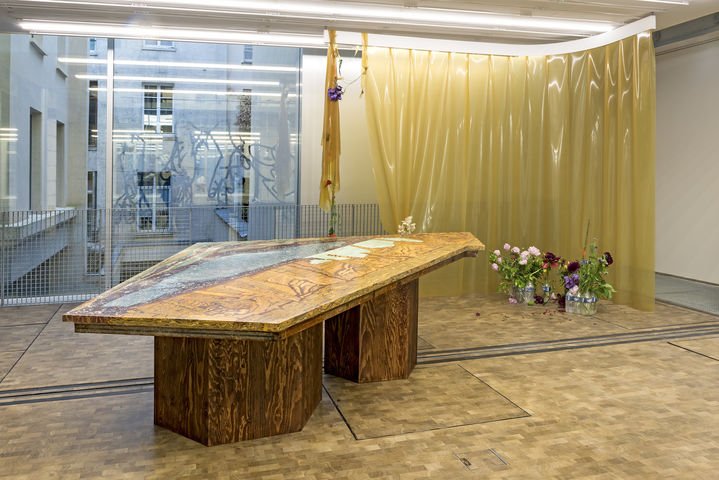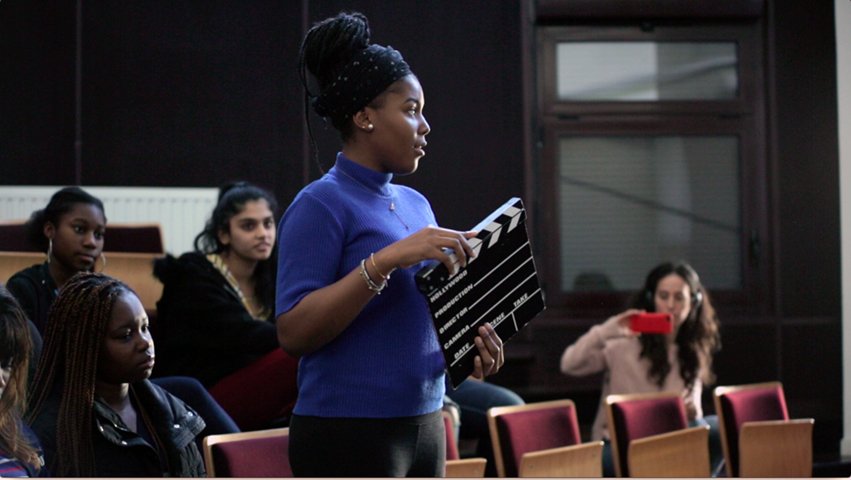Ève Chabanon, Anti Social Social Club, episode 1: The Chamber of the Dispossessed. 2017. Barking & Dagenham, United Kingdom. Image courtesy of the Anti Social Social Club. Photography by Gyte Gavenaite.
French artist Ève Chabanon’s practice of social performance, live action gatherings and film and object making advances a vision for a in depth conversation on the impacts of neo-liberal political issues. She asks how people can be more self determining in their lived environments and everyday lives. Chabanon takes on the role of facilitator by producing the conditions for engaging communitities in collective processes about individual and community wellbeing. The gatherings and performances rely upon the participation of audiences and their lived experience. Building intimacy and trust are key aspects of the projects so that particpants can bring tensions to the surface in the complex relationships that exist between them and the civic institutions, and the neo-liberal and capitalist systems of politics and economics they have to navigate. The projects often develop as spaces of encounter and become highly charged situations where particpants debate differently held positions on issues and expose some the difficulties they confront in their everyday lives within those power structures.
In a recent project Anti Social Social Club (2017), the artist brought together a cross section of the local residents in a situational performance called The Chamber of the Dispossessed, held in the council chambers, at Barking Town Hall, an East London local authority. The project took the form of a public discussion where participants drew on the space and utilities of the council chambers to enact a debate about self-governance, work, building community and survival. What emerged were the concerns communities faced as areas of the city went through an urban renewal. To Chabanon the timing of the project was crucial in light of current events: “the project took place right after Brexit and the London Bridge terrorist attack. The city’s communities seemed very fragile. My aim was to re-establish a playful dialogue between people in a performative way and to create a sense of collective fiction through gathering and participation”.
The Surplus of the Non-Producer (2017-ongoing) stems from Chabanon’s observation that craftspeople, artists and creative producers living in a situation of exile face multiple obstacles in practicing their trade: these difficulties include having the legal right to work; accessing raw materials, tools and workshops; the loss of the ability to present traces of past work; and the absence of wider professional networks and community support. An investigation into the relationship between practice, identity and systemic failures, the project aims to initiate a conversation, to reinvest in the ethics of the local and to create possibilities as well as value. The Surplus of the Non-Producer began with The Centre Cannot Hold, a group exhibition that took place at Lafayette Anticipations in Paris in 2018. The first year of the project was dedicated to building a network of Paris-based charity organisations, lawyers, activists and thinkers who are currently advocating for the social, legal, and professional enhancement and survival of exiled populations, especially within the arts and crafts sector in France.
In her earlier projects Chabanon scrutinised the underlying economies of creative production by exploring the conditions for producing creative work. Dear (2015-ongoing) is a website project Chabanon was invited to collaborate on with Raphaēl Bastide. Dear is a both a space of collaboration and a gathering place for cultural commentators, artists, journalists and others to share ideas through live correspondence. The project is an outputting of dialogue through email interactions and makes visible the exchange between creative producers and their critics.
Chabanon’s interest in live creative production processes also appears in other earlier projects where she has collaborated with educational institutions. This has required her cultivating trust between the institution and the students she works with. Band, (2014 - ongoing) project undertaken during her residency at Parc Saint-Léger and ESAAB (École supérieur d’arts appliqués de Bourgogne), investigates the conditions for creative production and display. This saw her produce a number of fictional bands to show that a shared narrative is built upon a ‘willingness’ of band members and their audiences to collaborate in a collective creative process. She has also worked closely with high school students from a lower socio-economic suburb on live projects to expose the discriminatory characteristics of the economic and educational systems they are ecpected to take part in. Chabanon says “the projects were about finding a form of independency within an oppressive system that supports exclusion and structural racism. The intention was to explore how the official pedagogical programme could be diverged to provide the schools with tools for creating possibilities and alternative futures for the students. For example the term ‘moonlighting’, meaning manufacturing one’s own goods while pretending to work for the employer, was one of the main subjects of the conversation”. Chabanon draws from interactive workshops, dialogue and other interactions she has with the students to reveal their nuanced identities of the participants and to question how these identities are shaped by societal norms and educational expectations.
SUPPORTED BY THE FRENCH EMBASSY IN NEW ZEALAND


